Discover The Manufacturers Network
The Manufacturers Network

The Manufacturers Network
Author: Lisa Ryan
Subscribed: 5Played: 118Subscribe
Share
© Copyright 2025 Lisa Ryan
Description
The Manufacturers’ Network is where manufacturing leaders, plant managers, and industry innovators come to talk straight about what’s working and what’s not, on the shop floor and beyond.
Each week, host Lisa Ryan sits down with people who live and breathe this business: operations executives, HR directors, engineers, and founders who are building stronger teams and smarter systems in the face of nonstop change.
Listeners gain real-world insights on:
• Employee retention and workforce engagement
• Automation, AI, and the future of skilled trades
• Supply chain and operations leadership
• Safety, sustainability, and company culture that lasts
If you’re tired of generic “leadership talk” and want practical conversations from people who get it, this podcast is for you.
New episodes drop every Monday and are short enough for your commute, sharp enough to shape your week.
Subscribe and be part of the conversation that’s connecting manufacturers across industries, one story at a time.
Each week, host Lisa Ryan sits down with people who live and breathe this business: operations executives, HR directors, engineers, and founders who are building stronger teams and smarter systems in the face of nonstop change.
Listeners gain real-world insights on:
• Employee retention and workforce engagement
• Automation, AI, and the future of skilled trades
• Supply chain and operations leadership
• Safety, sustainability, and company culture that lasts
If you’re tired of generic “leadership talk” and want practical conversations from people who get it, this podcast is for you.
New episodes drop every Monday and are short enough for your commute, sharp enough to shape your week.
Subscribe and be part of the conversation that’s connecting manufacturers across industries, one story at a time.
200 Episodes
Reverse
Building a Legacy of Quality and Creativity in Manufacturing with David SochaIn this episode of The Manufacturers Network Podcast, host Lisa Ryan chats with David Socha, CEO of Beverly Hills Teddy Bear Company. David shares how he built a family business focused on creativity, ethics, and global adaptability in the world of plush toys. Whether you're a manufacturing leader, entrepreneur, or curious about business culture, this episode is full of practical advice and actionable steps.Key Takeaways You Can Use:1. Consistency Is Key - David credits showing up every day and looking beyond daily setbacks as crucial to long-term success in manufacturing. If you’re managing a team or a business, build routines that keep you and your employees focused on the bigger picture, not just the day-to-day challenges.2. Focus on Quality Over Quantity - For manufacturers in crowded markets, David’s advice is simple: Make great, unique products. Don’t just copy trends; put effort into improving your product and set higher standards. Customers and employees notice the difference.3. Legacy Through Family Culture - David involves his family at every stage of the business—from warehouse work to creative brainstorming. He believes exposing children to the business early increases the chance of generational succession. For other family-owned companies: get your kids involved in small, meaningful ways.4. Ethical Manufacturing Matters - David’s company visits every manufacturing site, builds long-term relationships, and chooses partners who share their values. If you outsource, audit your suppliers and don’t compromise on ethics for lower costs.5. Global Adaptability - Trends in toys (and other products) now travel fast worldwide. Manufacturers must track global influences and adapt quickly. David’s team keeps a close watch on rising trends from places like Asia and pivots accordingly.6. Employee Engagement and Purpose - Today’s workforce wants to be part of something meaningful—they’re not interested in making throwaway goods. If you want to attract and retain talent, communicate your business’s larger purpose and invest in product improvements that employees can be proud of.7. Resilience in the Face of Challenges - From supply chain disruptions to market shifts, David explains how deep, long-term partnerships with suppliers help weather storms. Invest time in building trusted relationships with your vendors and partners—find allies who share your long-term vision.Action Steps for Listeners:- Audit your supplier relationships and visit their facilities where possible.- Review your product line—where can you raise the standard or add unique value?- Bring team members or family into business brainstorming sessions; fresh perspectives spark innovation.- Develop a “bigger purpose” message for your employees to help foster pride and retention.- Track rising trends, especially from international markets, and stay agile in your planning.Connect with David Socha:- Email: david@plush.com- LinkedIn: Search “David Socha Toy Company”- Website: https://plush.comListen, learn, and start building a legacy of quality and ethics in your manufacturing business.
Quick question, when's the last time your team truly celebrated a win? Not the "pizza in the breakroom" celebration. I mean real, meaningful recognition that made people feel proud and inspired them to keep going.Here's the truth: celebrating wins isn't just nice-to-have, it's fuel for your culture. When you do it right, your applause doesn't just pat people on the back. It keeps them engaged, loyal, and striving for excellence.------------------This episode is brought to you byGrategy, where we help manufacturing leaders create cultures people want to work in and nobody wants to leave. Through the Six Gears of Grategy®, we give leaders practical tools to strengthen their teams and drive results, from onboarding to recognition strategies that actually stick. Learn more at LisaRyanSpeaks.com.---------------------We celebrate the big wins, major milestones, huge contracts, and completed projects. And we definitely talk about problems when things go wrong. But what about the middle ground? The day-to-day excellence when people are quietly doing great work? That usually goes unnoticed.Here's what we're missing: countless moments worth celebrating. Catching a problem before it becomes a crisis. Finding a better way to do something. Consistently hitting deadlines. These small victories deserve recognition too.When you celebrate these moments, you're not just making someone feel good. You're reinforcing the behaviors you want to see more of. You're connecting employees back to the mission and reminding them why their work matters. That's what fuels pride, loyalty, and ongoing engagement.Busting the Myths:Myth #1:Recognition means big, formal programsTruth: Awards dinners and plaques have their place, but if that's the only time people hear"thank you," you're missing the most powerful driver of engagement: recognition in the moment.The best applause happens organically. When someone calls out a coworker during a shiftmeeting for jumping in to help. When a team lead thanks an operator right on the line for catching an error. These moments are specific, sincere, and tied directly to behaviors you want to see again.And recognition doesn't have to come from leadership alone. Peer-to-peer recognition is often more powerful because it comes from people who work alongside you every day and know exactly what it takes to do the job well.Myth #2: If people are doing their job, they don't need applauseTruth: There's a huge difference between doing your job and doing it well. If leaders only speak up when something goes wrong, employees start feeling like their best efforts don't matter.Recognition isn't coddling, it's reinforcing right behaviors, building morale, and keeping people motivated to give their best. And here's the kicker: it doesn't matter what generation someone belongs to. Baby Boomers, Gen X, Millennials, Gen Z, everyone wants to feel valued for their work.Four Strategies That Work Strategy 1: Be Specific, Not GenericA quick "good job" is fine, but it's vague. Instead, call out exactly what the person did and why it mattered. "You caught that defect before it left the plant, which saved us from a costly recall." Now they know their actions had real impact.Quick Action: In your next conversation, name the specific behavior and the result it created.Strategy 2: Make It TimelyRecognition loses its punch when it comes weeks later. I remember a colleague who won a trip to Hawaii. Her manager took three weeks to congratulate her. After she went on the trip, she left the company.Quick Action: Recognize someone within 24 hours of their achievement. Even a quick hallway conversation matters when the timing is right.Strategy 3:...
Welcome to The Manufacturers Network Podcast! In this insightful episode, Lisa Ryan sits down with Jason Rolland, Senior Vice President of Materials at Carbon Inc., to explore the rapidly evolving impact of additive manufacturing on how products are designed, produced, and scaled. Jason offers an insider’s view informed by years of expertise in polymer chemistry, entrepreneurship, and industrial material science.In This Episode, You’ll Learn:How Additive Manufacturing EvolvedJason Rolland traces how 3D printing moved beyond prototyping, now enabling the production of finished parts with improved speed, precision, and material properties.-Key Innovations Driving Production ViabilityDiscover the breakthroughs in materials science, hardware speed, and software that allow for faster print times, better mechanical properties, and digital-driven production processes.- Breaking Down the Technology Not sure about acronyms like FDM or SLA? Jason explains the main categories of 3D printing in clear, simple language and describes their pros and cons.- Where Additive Manufacturing Makes the Biggest ImpactFrom footwear and sports equipment to medical devices and dental models, Jason shares real-world examples where 3D printing offers a competitive edge—especially for customized parts and foam replacements.- Barriers to Adoption & How to Overcome ThemFind out why manufacturers hesitate to adopt new technologies, and how issues of cost, awareness, and application fit can be addressed.- Evaluating If Additive Manufacturing Is Right for Your Business Get practical advice on the types of products best suited for 3D printing and the factors manufacturers should consider before making the transition.- Sustainability and Flexibility Benefits Learn how additive manufacturing supports supply chain resilience, reshoring, reduction in carbon footprint, and new approaches for cleaning, recycling, and using bio-based materials.- Getting Started Without Overinvesting Jason outlines Carbon’s partnership model, emphasizing collaboration over upfront equipment sales so manufacturers can test applications risk-free.Tangible Takeaways1. Focus on Product Application: Evaluate whether additive manufacturing will improve your product’s performance or unlock new design possibilities—don’t just jump in for the technology’s sake.2. Consider Customization and Complexity: Additive manufacturing thrives in producing complex, customized, or low-volume parts—especially when traditional tooling is cost-prohibitive or slow to adapt.3. Factor in Speed, Cost, and Flexibility: Digital production allows rapid switching between product types, making it ideal for nimble, local, and scalable manufacturing operations.4. Think Sustainability: Local production and material efficiency can lower the carbon footprint. Explore innovations in part cleaning and bio-based resins for further environmental benefits.5. Start with Collaboration: Instead of investing heavily upfront, partner with experienced additive manufacturers like Carbon to test the fit for your specific application.Ready to explore additive manufacturing for your business?** Reach out through Carbon’s website contact form to start a conversation with Jason and his team.---Tune in next time on The Manufacturers Network Podcast for more insights, strategies, and manufacturing success stories!
In this episode of The Manufacturers Network Podcast, Lisa Ryan talks with Dag Calafell, a 25-year technology veteran helping global manufacturers modernize through Microsoft solutions. Dag shares how his early days as a developer at Parker Hannifin led him to his current role at MCA Connect, where he works with manufacturers to turn digital transformation into practical results.They dig into where AI and automation actually move the needle in manufacturing, the hesitation many leaders still feel about new technology, and how companies can connect plant-floor data with back-office systems. Dag and Lisa explore everything from AI-powered cost tracking and maintenance insights to how internal hackathons can fuel innovation and upskill teams.Key Takeaways:A strong data foundation is critical for any AI or automation success.AI and automation can ease workforce shortages and improve agility.How manufacturers are using AI for production costing, defect detection, and predictive maintenance.Treating AI initiatives like continuous improvement projects rather than one-time fixes.The power of cross-functional collaboration and shared learning in tech adoption.Why ROI timing matters more than having the newest technology.Memorable Moment: “AI doesn’t have to replace people, it can make the work we already do smarter. The key is treating it like continuous improvement, not a one-time project.” — Dag CalafellConnect with Dag Calafell: MCAConnect.comConnect with Lisa Ryan: LisaRyanSpeaks.com👉 LinkedIn: Lisa Ryan, CSP
Connect with Lisa on LinkedIn: www.linkedin.com/in/asklisaryanHere's something I know to be true: Employees don't just want to work for a Paycheck — they want to work for a purpose. They want to be part of something bigger than themselves.And here's the good news: manufacturing companies are uniquely positioned to deliver exactly that. When you give back — to your employees, your community, and causes that align with your values — you're not just doing good in the world. You're building loyalty, pride, and a culture people fight to stay in.Today, we're talking about Acts of Service That Build Loyalty — how purpose-driven companies create stronger teams by making the world a better place.________________________________________This episode is brought to you by Grategy — where we help manufacturing leaders create cultures people want to work in and nobody wants to leave. Through the Six Gears of Grategy®, we give leaders practical tools to strengthen their teams and drive results — from onboarding to leadership development to purpose-driven culture strategies that inspire loyalty. Learn more at LisaRyanSpeaks.com.________________________________________Why This Matters More Than EverYears ago, "giving back" was an afterthought; something you did with leftover time and budget. But today's workforce has fundamentally different expectations. They want to work for organizations that stand for something beyond profit margins.I see this passion at every association meeting I keynote at. The event locations are full of people who are passionate about things that most people totally take for granted. They are also deeply committed to solving problems most of the world doesn't even know exist: technical challenges, industry innovations, breakthrough solutions. They're not just making products; they're making things that matter.The pandemic proved this point powerfully. Almost overnight, companies pivoted to produce masks, face shields, ventilator parts, hand sanitizer, whatever was needed. It didn't matter if it fit their business model; they stepped up because it was right. And employees felt it. They knew they were part of the solution, contributing to something that truly mattered.That sense of purpose stuck. And many employees are still looking for that feeling today.As Simon Sinek says, "People don't care what you do, they care why you do what you do." Employees are asking: What does this company believe in? Does my work matter beyond the product we make? Are we using our influence to make a difference?When the answer is yes, and when your actions match your words, that's when people feel a deep, emotional connection to your mission.And that connection creates loyalty you simply can't buy. ________________________________________Busting the MythsMyth #1: Purpose-driven culture is only for non-profitsManufacturing companies can have even more impact by tying their products, services, and profits to something meaningful. Take a packaging company. On the surface, it's boxes and pallets. But what if their mission includes using sustainable materials and helping customers hit environmental goals? Now they're not just "making boxes" — they're contributing to a cleaner planet.Or consider a tool-and-die shop sponsoring scholarships for local students in skilled trades. They're not just filling a talent pipeline — they're changing lives and giving young people a future in manufacturing.Manufacturing moves the needle because you're part of the infrastructure that keeps the world running.Myth #2: Acts of service have to be massive initiativesIt's not about writing big checks or launching high-profile campaigns. It's about creating authentic opportunities...
In this episode, Lisa Ryan talks with Laura Phillips, Vice President of Engineering and Procurement at Pella Corporation, about what it really takes to sustain a century-old company while staying future-ready. Laura shares how Pella’s culture of caring boldly, where truth, accountability, and collaboration coexist, continues to drive innovation and inclusion across 21 manufacturing sites and 11,000 team members.From her early doubts about fitting into a male-dominated field to leading large engineering and procurement teams, Laura traces her journey through mentorship, curiosity, and courage. She and Lisa dig into how manufacturers can modernize without losing their soul, create workplaces where people belong, and make manufacturing a career destination for the next generation.Key Takeaways:Turn Fear into Fuel: Manufacturing isn’t the “dirty and dull” image from old textbooks—it’s bright, high-tech, and full of creativity and problem-solving.Caring Boldly: Pella’s three culture pillars: care, learn, deliver results, show up in how teams challenge each other honestly while still supporting one another.Innovation Through Listening: The award-winning SteadySet installation system was born from conversations with installers about safety, efficiency, and pride in their work.Representation Matters: From hosting Girl Scouts to collaborating with universities, Laura shows how early exposure changes how young people, especially girls, see the trades.Flexible Futures: Four-day workweeks, job sharing, and automation are reshaping what flexibility looks like on the factory floor.Tech That Serves People: Automation at Pella is designed to reduce strain, prevent injury, and make jobs more ergonomic and rewarding.People Before Process: Laura’s bottom line: strategy fails without people. Listen first, engage early, and build every improvement together.Memorable Quote: “No strategy is effective without the team. The people are the most important thing; make it about them.”Connect with Laura Phillips:🔗 LinkedIn: Laura PhillipsAbout the Host:Lisa Ryan, CSP, is a keynote speaker, author, and Chief Appreciation Strategist at Grategy®, helping manufacturers and skilled-trades organizations keep their best employees from becoming someone else’s. Learn more at Grategy.com.
In this episode of The Manufacturers Network Podcast, Lisa Ryan sits down with Ben Wynne, Chief Technology Officer of Intrepid Automation, to explore how additive manufacturing and automation are transforming modern production—without erasing the craftsmanship and knowledge that built it.Ben shares how his team helps manufacturers digitize decades-old tooling, preserve tribal knowledge, and bridge the gap between traditional foundries and cutting-edge technology. Their approach proves that innovation doesn’t have to mean disruption, it can mean integration.Together, they discuss:Why the future of manufacturing depends on capturing legacy expertise before it’s lostHow additive manufacturing can strengthen, not replace, existing processesThe role of AI and automation in reshoring and reindustrializationPractical ways smaller manufacturers can collaborate with tech partnersHow to keep your workforce engaged (and unafraid) as technology evolvesBen also offers a powerful reminder: the factory of the future isn’t built on robots alone, it’s built on memory.Connect with Ben Wynne:LinkedIn: Ben WynneWebsite: Intrepid Automation#Manufacturing #AdditiveManufacturing #Automation #Leadership #WorkforceDevelopment #Innovation #CrackingTheRetentionCode
In this episode of The Manufacturers Network Podcast, host Lisa Ryan talks with Sameer Narkar, Founder and CEO of Konnect Insights, a bootstrapped SaaS company that’s redefining how enterprises manage customer experience.What started as a small team of engineers in India has grown into a platform used by 400+ global brands in 35+ countries, managing over a billion customer interactions every year. Konnect Insights helps businesses unify social listening, omni-channel ticketing, analytics, and publishing all in one place.Sameer shares what it takes to grow a tech company without external funding, how AI can actually simplify work instead of overcomplicating it, and why passion and trust, not just technology, win customers and retain top talent.In This Episode, You’ll Learn:What “omni-channel” really means for customer experience (and why most companies get it wrong)The difference between plug-and-play AI and purpose-built, “home-cooked” AIHow to scale globally using partnerships instead of massive ad budgetsWhy emotional connection often lands your first five clients before product maturity doesHow to navigate language, culture, and local regulations when expanding internationallyThe three factors that keep core employees loyal for the long haulKey Quote: “Your first customers don’t choose you because you’re the biggest or best; they choose you because they believe you’ll go the extra mile.” — Sameer NarkarAbout Sameer Narkar: Sameer Narkar is the Founder and CEO of Konnect Insights, a unified customer experience management platform combining social listening, omni-channel ticketing, analytics, and publishing. Under his leadership, Konnect Insights has grown organically into a trusted enterprise solution for global brands across 20+ industries.Connect with Sameer: LinkedIn: Sameer NarkarWebsite: Konnect InsightsConnect with Lisa: Website: LisaRyanSpeaks.com LinkedIn: Lisa Ryan, CSPListen now to learn how Sameer turned curiosity, persistence, and partnerships into a global success story and why staying human is still the smartest growth strategy of all.
In this episode of The Manufacturers Network Podcast, host Lisa Ryan sits down with Brent Hagan, Chief Supply Chain Officer at Lob, to explore what it really means to lead with impact: in business, in culture, and in community.With experience at Amazon, Deliver, Eaton, and Lob, Brent brings a rare perspective on how to scale operations without losing the human connection. He shares stories from massive fulfillment centers to small-town manufacturing plants, where leadership goes far beyond efficiency metrics. From creating bus routes for workers to strengthening local schools, Brent’s approach shows that true supply chain success isn’t just operational, it’s personal.What You’ll Learn:How leaders can leave the communities they enter better than they found themThe balance between autonomy, accountability, and culture on the shop floorWhy technology should simplify, not replace, human problem-solvingThe biggest mistakes companies make during mergers and acquisitions—and how to avoid themHow small and mid-sized manufacturers can use digital tools without losing their people-first approachWhy something as simple as a whiteboard can outperform high-tech dashboardsKey Quote: “You don’t need a building full of Harvard MBAs. You need people who say, ‘This is what we tried, here’s what we learned, and here’s what we’ll do next.’” — Brent HaganAbout Brent Hagan: Brent Hagan is the Chief Supply Chain Officer at Lob, where he leads logistics, supply chain, and operations strategy for a platform powering billions of personalized mail pieces. With leadership experience at Amazon, Deliver, and Eaton, Brent specializes in bridging traditional operations with technology-driven innovation—while keeping people and community at the heart of every strategy.Connect with Brent: LinkedIn: Brent HaganConnect with Lisa:Website: LisaRyanSpeaks.comLinkedIn: Lisa Ryan, CSPListen now to learn how to build a culture that scales and a company that leaves every place it touches better than before.
In this episode, host Lisa Ryan sits down with Eric Wick, founder of Safety Team Technologies. Drawing from over 15 years of experience in insurance and hands-on safety consulting, Eric shares his journey from the financial sector to creating innovative solutions for blue-collar safety and OSHA compliance.Key Topics & Takeaways:From Finance to the Shop Floor:Eric recounts his early career pivot from finance to industrial sales and, eventually, risk management for blue-collar businesses. Learn how his dedication to supporting small business owners shaped his approach to safety and compliance.The Pain Points of OSHA Compliance:Discover the two sides of OSHA compliance—the written Injury Illness Prevention Program (IIPP), which is easier to create than ever before, and the real challenge: implementation and documentation of ongoing safety meetings and hazard assessments.Insurance Premiums & Experience Mods Demystified:Eric explains why manufacturers face higher workers compensation premiums and illustrates, with real-world examples, just how costly workplace injuries can be. He offers practical steps to reduce claims and improve your insurance rates.The Power of Recurring Safety Training:Consistency is key! Eric shares why regular, relevant safety trainings (especially with quizzes and gamification) not only reduce accidents but can translate into significant cost savings for businesses.Leveraging Technology & Automation:Eric provides actionable tips on using automated software for tracking safety meetings, hazard assessments, and employee attendance, making compliance less of a headache and more of a business asset.Building a Safety-First Culture:Eric and Lisa discuss the importance of showing employees that safety initiatives are about caring for their well-being—not just checking the OSHA compliance box.Practical Tools & Resources:Eric highlights a free OSHA compliance checklist available on the Safety Team Technologies website and explains how their automated platform can fit any manufacturer’s workflow and budget.Who Should Listen:Manufacturing leaders, HR professionals, safety managers, insurance brokers serving blue-collar industries, and anyone interested in practical strategies for safer, more compliant workplaces.Resources Mentioned: Download a Free OSHA Compliance Checklist: oursafetyteam.com Schedule a no-pressure demo or enroll in automated safety training starting at just $5/employee/monthConnect with Eric Wick:Discover how to simplify OSHA compliance and enhance your safety culture at oursafetyteam.com.Don’t miss this episode if you want to streamline compliance, lower insurance premiums, and send your people home safer every day!
Are you accidentally sabotaging your best people? Even the most skilled, motivated employees can only perform as well as the tools, information, and support they’re given. When access is blocked—whether it’s equipment, training, or their leader, frustration rises, productivity drops, and great talent walks out the door.In this episode of The Manufacturers Network, Lisa Ryan, CSP, breaks down how to remove everyday barriers and create Access That Empowers—so your team can do its best work and choose to stay.You’ll learn:Why the old “stay in your lane” hierarchy doesn’t work anymoreWhat today’s employees expect from leaders (approachability, trust, and real connection)The hidden costs of limited access: bottlenecks, mistakes, and missed ideasFour practical strategies to create access:Ask before it’s a problemBe human and approachableEliminate friction in tools, processes, and trainingOpen doors to growth (cross-training, shadowing, clear paths)Key idea: When you make success easier for your people, they make success inevitable for you.Brought to you by Grategy — helping manufacturing leaders create cultures people want to work in and nobody wants to leave. Learn more at LisaRyanSpeaks.com.
In this episode of the Manufacturer’s Network Podcast, host Lisa Ryan welcomes Reeves Smith, Director of Sales at Leapfrog, to share his decades of IT experience helping manufacturers tackle cybersecurity, digital transformation, and the complexities of modernization. Reeves breaks down real-world challenges and actionable steps for manufacturing leaders ready to secure and streamline their operations.Key Topics Covered:Common Technology Struggles for ManufacturersReeves shares why so many small and midsize companies hit technology roadblocks as they try to scale up and modernize, and how the pace of tech change often outstrips internal IT skills and resources.The Truth About Cyber ThreatsWhy being a smaller manufacturer doesn’t mean hackers will overlook you—attackers are often targeting your organization’s connections and customer networks. Hear a real story of a multi-million-dollar impersonation attack that almost put a business under.The Evolving Cybersecurity LandscapeThreats are growing more sophisticated, and so are the entry points—from IoT devices to remote laptops. Reeves explains why old strategies won’t cut it for today’s manufacturing environments.People: The Essential Security LayerMost cybersecurity breaches start with people, not just failed technology. Reeves emphasizes the importance of workforce training, proactive testing, and building a culture of security awareness at every level.How AI Is Changing the GameFrom AI-powered phishing to deepfake scams that trick even top executives, manufacturers need to be vigilant. Plus, practical advice for manufacturers just starting to explore AI and automation—like making use of AI tools already embedded in their current platforms.Laying the Foundation for InnovationBefore investing heavily in AI, Reeves explains why upgrading infrastructure, managing and integrating data, and moving applications to the cloud are critical first steps to success.Smart Steps for Digital TransformationFind out how to prioritize the right projects, avoid costly missteps with public AI tools, and get buy-in from the team, especially when introducing changes to legacy systems.Navigating Change and Job Security FearsReeves addresses worries about AI taking jobs and offers a constructive way for employees to use technology as a tool for growth, not just efficiency.Why Partnering with Experts MattersWith security and technology demands growing, Reeves highlights the benefits of working with an experienced IT partner for strategic advice and reliable protection.Top Takeaways:Don’t assume you’re too small to be a target—cybercrime affects manufacturers of all sizes.Invest in workforce education; people are your first (and often weakest) cybersecurity layer.Start with the infrastructure and data management before chasing advanced AI.Use trusted IT partners to assess your situation and guide tailored solutions.Consider security and productivity side by side—good cybersecurity shouldn’t slow down production.Connect with Reeves Smith and Leapfrog: Email: reeves.smith@leapfrogservices.com Website: leapfrogservices.com Ready to modernize your manufacturing security? Listen to this episode for an expert’s roadmap to resilient, future-ready operations!
In this episode of the Manufacturers Network Podcast, Lisa Ryan welcomes Grace Bilbrough, Director of Marketing for ProWood, a leading brand under UFP Industries. Grace shares her journey from event planning to becoming a key marketing strategist, and reflects on the pivotal role company culture played in ProWood’s successful rebrand and business transformation.Grace and Lisa dive deeply into the importance of transparency, open communication, and recognizing employee contributions as cornerstones of Pro@ood’s culture. Grace reveals practical ways her team bridges cross-department silos, fosters entrepreneurial thinking, and keeps employees motivated, even throughout periods of change and growth. She offers insights into how initiatives like leaderboards, town halls, and regular updates keep competitive spirits high and teams aligned with company goals.Learn how new ideas—like the launch of ProWood’s upcoming True Frame Joists—are sourced directly from employee feedback on the front lines, and how their culture of care extends from manufacturing lines to customer partnerships. Whether you’re navigating change in your own organization or looking for fresh ways to spark employee engagement, Grace shares actionable takeaways you can implement today.Key Topics:The value of transparency and honest communication through changeEncouraging innovation and entrepreneurship across a large organizationPractical strategies for employee recognition and alignmentCollaborating across marketing, sales, operations, and product teamsTranslating internal culture into long-lasting customer relationshipsConnect with Grace Bilbrough on LinkedIn or via email at GBilbrough@prowood.com to continue the conversation.Tune in for actionable advice and inspiring stories about building a people-first culture in manufacturing!
Welcome to the Manufacturer’s Network Podcast! In this episode, host Lisa Ryan sits down with Ben Hansen, a 5-time Inc. 5000 entrepreneur, founder of an 8-figure staffing firm, and expert in maximizing profitability for $2M–$50M companies. Ben is the "Profit Doctor," helping businesses identify and eliminate “profit leaks” to significantly boost bottom-line results.Key Topics Covered:- Ben’s Journey: From his early days at Dell and Microsoft to launching his own fast-growth company and eventually becoming the go-to expert for curing "profit-itis."- Understanding Profit-itis: Why having strong revenue doesn’t always mean healthy profits, and what profit-itis looks like in manufacturing companies.- Biggest Profit Myths Debunked: The dangers of focusing solely on revenue growth and why the popular “hockey playbook” doesn’t work for most businesses.- The 80/20 Rule & The 50/20 Formula: Ben explains how identifying and cutting the least profitable products, clients, and employees can fast-track margin improvement.- Profit Killers: How profit psychology, unprofitable products, toxic employees, and the myth that “more is always better” can undermine your success.- Simplifying Financials: Transforming complex P&Ls into actionable reports that help non-accountants make better decisions.- Accounting Blind Spots: Common mistakes in financial analysis, including underestimating the cost of difficult clients and the impact of soft costs.- Growing Without Growing: How many firms can substantially improve profits without adding a single dollar to revenue—sometimes by getting smaller and more focused.- Actionable Steps: Ben shares his Profit Accelerator and Profit CFO programs, designed to simplify your numbers and create massive gains.Resources & Links:- Connect with Ben Hansen at https://www.profitdoctor.com - Find Ben on LinkedIn: https://www.linkedin.com/in/benhansenprofitdoctor - For CEOs looking to break the cycle of low profits, schedule a check-in with BenIf you’re a business leader tired of working harder for less, this episode is packed with practical insights and real-world strategies you can put to work right away!
Too often in the workplace, recognition is either generic, forced, or inconsistent, and when that happens, it loses its power. But when done well, recognition is one of the most powerful tools you have to inspire loyalty, engagement, and long-term retention.In this episode of The Manufacturers Network, Lisa Ryan, CSP, shares how to make recognition meaningful, personal, and consistent, without breaking the budget or making it awkward.You’ll discover:Why recognition is one of the most underutilized retention strategiesThe biggest myths about recognition — and how to overcome themHow to make recognition specific, timely, and tied to your missionSimple tools like peer-to-peer recognition and “All About Me” sheetsFour practical strategies you can implement right away to make recognition stickWhen employees feel seen and valued for their everyday contributions, they don’t just stay, they thrive.Brought to you by Grategy, helping manufacturing leaders create cultures people want to work in and nobody wants to leave. Learn more at LisaRyanSpeaks.com.
In this episode of the Manufacturers Network Podcast, host Lisa Ryan sits down with Harish Chandramowli, co-founder of Flaire and an expert in software engineering and data management. Harish, bringing a fresh perspective from outside the traditional manufacturing space, discusses how technology and a data-driven approach can transform the way fashion brands operate, from production planning to supply chain management.Discover why fashion manufacturing is vastly more complex than most industries due to SKUs, color variations, and the speed of trends. Harish explains how legacy processes relying on PDFs and emails hinder efficiency and highlights the revenue risks that come from lost or mismanaged data. He also shares real-life stories from working with emerging brands and the importance of adopting scalable, nimble workflow tools before investing in a full-fledged ERP.Whether you're a small business wrestling with spreadsheets or looking to streamline operations with AI and automation, Harish's advice will help you harness the power of data from day one. He shares practical tips for getting started with affordable modern tools, maintaining data sanity, and adapting workflows as your brand grows.Key Takeaways:Why SKUs and data management are especially critical in fashion manufacturingHow delays and lost data translate to lost revenue in fast-moving industriesThe surprising complexity of different manufacturing sectorsStrategies for improving data entry and usage even with limited resourcesWhen (and when not) to invest in ERP softwareHow AI tools and spreadsheets can kickstart your data organizationA vision for the future of lightweight, customizable workflow platformsConnect with Harish:Reach out to Harish Chandramowli on LinkedIn: https://www.linkedin.com/in/scharish/ for more insights on workflow automation, data-driven manufacturing, and a candid discussion about your business operations.Tune in now to learn how you can revamp your production and supply chain strategies—with Harish Chandramowli!
In this episode of the Manufacturer’s Network, Lisa Ryan dives deep into one of the most critical and overlooked moments in any manufacturing employee’s journey: onboarding. She reveals why those first 90 days are the make-or-break window for retention and explores how traditional onboarding, centered on paperwork and compliance, is failing new hires. Lisa shares practical, high-impact strategies to shift onboarding from a box-checking task to a powerful tool for connection, engagement, and long-term retention.You’ll learn:The real reason employees leave in their first 90 days and how to prevent it Why onboarding actually starts before Day One and what you can do during that “T-minus” period Ways to make new hires feel welcome before they even walk in the door The critical role leaders and peers (not just HR!) play in successful onboarding Simple, actionable ideas: from welcome kits to buddy systems, that create belonging and boost morale The importance of regular check-ins and personal touches to keep employees engaged from the start Lisa also previews next week’s topic on recognition strategies that foster loyalty. Tune in for fresh insight and actionable tips you can put to work right away in your organization!Links: Learn more about Lisa’s work and resources: lisaryanspeaks.comConnect with Lisa on LinkedIn or email her your questions for a chance to be featured in a future episode!Remember:Culture isn’t a perk—it’s your strongest competitive advantage. See you next time!
On this episode of the Manufacturers Network, host Lisa Ryan sits down with William Spengler, founder of Frederick Fox, a recruiting firm that’s helped over 700 companies hire standout finance professionals for manufacturing and beyond. William brings more than 15 years of agency recruiting experience and a background in cost accounting to this candid conversation about winning the race for manufacturing finance talent.What You’ll Learn:- Why plant finance roles are some of the hardest jobs to fill in manufacturing today.- How proactive networking within a 25-mile radius gives CFOs an edge before hiring becomes urgent.- The post-pandemic shift: Why most manufacturers are moving finance talent back onsite, and how that impacts recruiting.- Creative strategies CFOs can use to stay salary-competitive without breaking the P&L.- How remote flexibility and company culture play into long-term talent retention.- The “human-first” approach that helps land highly specialized candidates—even when relocation is involved.- Insider tips for manufacturers scaling through organic growth or private equity: what to plan for in hiring and onboarding.- Why a magical first day (with swag!) and a thoughtful onboarding process make recruiters’ and candidates’ lives easier.Key Moments:- William’s journey from cost accountant to recruiter, and why industry experience matters - The importance of trust and flexibility in today’s workplace culture - Real-world examples: moving high-value talent across states and crafting a personalized candidate experience - Unique perks companies are using to stand out—think HOA discounts and wellness benefits - How to have the right internal conversations before starting your next finance searchIf you’re a manufacturing leader or CFO struggling to find—and keep—great finance people, this episode is packed with practical advice and fresh perspective.Connect with William Spengler: - LinkedIn: https://www.linkedin.com/in/willspengler - Website: https://www.frederickfox.comListen in for the strategies and mindset you need to build a finance dream team in today’s market!
Welcome to a brand new chapter of the Manufacturers Network Podcast! In this high-impact solo episode, Lisa Ryan dives into the critical workplace culture shifts manufacturing leaders need to make NOW to attract and retain top talent into 2026.Lisa breaks down the three essential culture shifts every manufacturing organization must implement:Purpose Over Pay: Move beyond wages and help employees connect their work to a bigger mission.Recognition as a Habit: Discover why daily, specific recognition is the secret sauce for boosting morale and driving results.Acts of Service: Learn how removing small frustrations and truly listening to your people transforms your workplace.Every culture shift comes with an actionable step you can implement this week; no fluff, just real-world strategies you can carry right onto the shop floor or into the boardroom.Lisa also teases upcoming episodes focused on onboarding strategies that go beyond HR paperwork to make new hires feel valued (and stick around!).Key Takeaways:How to connect employees with purpose for stronger retention.The power of intentional, frequent recognition.Why small acts of service and problem solving matter more than grand gestures.Simple action steps to build a culture people don’t want to leave.If you’re ready to lead with purpose and build teams that last, this episode is for you!Connect with Lisa Ryan: LinkedIn: Lisa Ryan Email: lisa@grategy.com Learn more: lisaryanspeaks.comBrought to you by Grategy: practical tools for manufacturing leaders to strengthen teams and boost retention.Subscribe for upcoming episodes featuring expert guests and more practical strategies from Lisa!
In this episode of The Manufacturer’s Network Podcast, host Lisa Ryan sits down with David Blue, founder and CEO of Saltbox Mgmt. With over a decade of experience in digital strategy, Salesforce implementation, and enterprise sales, David shares candid insights into how manufacturers can modernize operations, enhance customer engagement, and thrive in a rapidly changing landscape.What’s Inside:- David’s Journey: How the pandemic was the catalyst for starting Saltbox Mgmt and why manufacturers still have a long road ahead in digital transformation.- Changing Buyer Demographics: The shift in customer expectations—how younger, “born-online” buyers want more self-service and digital options.- Blending Old & New: Why it’s not about choosing between personal relationships or automation—but creating frictionless, blended experiences across multiple channels.- Practical Automation Wins: Real-world examples (like Shorr Packaging) of starting small—digital commerce, order intake, and ERP integration—to drive efficiency without disrupting value-added jobs.- The Human Element: How digital tools free up sales and service teams to focus on high-value activities, rather than replacing jobs outright.- Combatting Tariffs with Tech: Unpacking David’s Salesforce blog—how digital commerce and order management can help manufacturers defend their margins and adapt to global trade uncertainty.- Subscription Economy for Manufacturers: What it takes to successfully offer digital subscriptions and services alongside physical products—including why good data and systems integration are essential.- Data-Driven Decisions: The importance of clean, real-time data to enable self-service and support next-gen business models.- Where to Start: David’s #1 tip for manufacturing leaders—talk to your customers, prioritize high-value/low-effort wins, and remember: transformation is a journey, not a sprint.Connect with David Blue: https://www.linkedin.com/in/david-blue/- Saltbox Mgmt: https://saltboxmgmt.comKey Quote: “Listen to your customers. Build a roadmap around what they want and start with small, high-value wins to fuel your digital journey.”


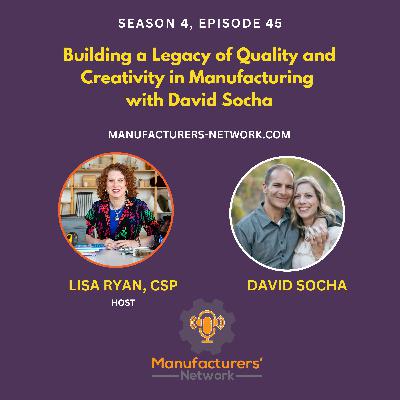
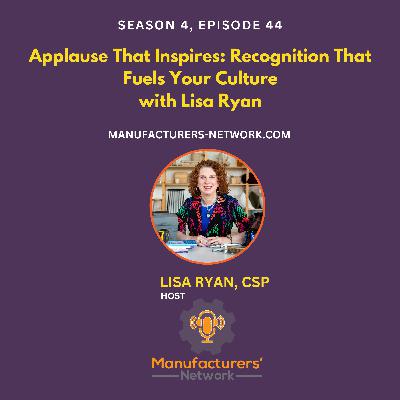
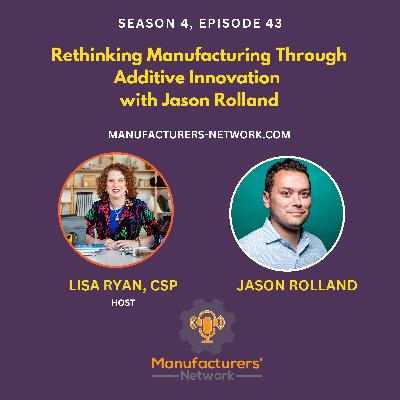
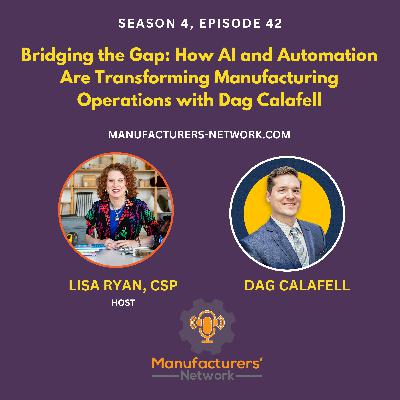
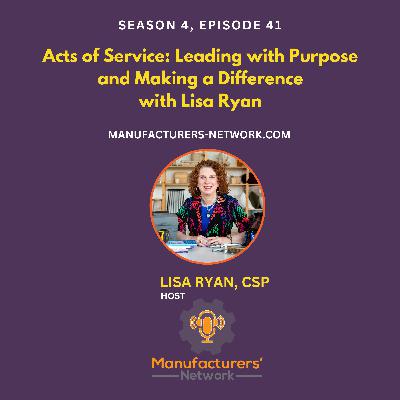
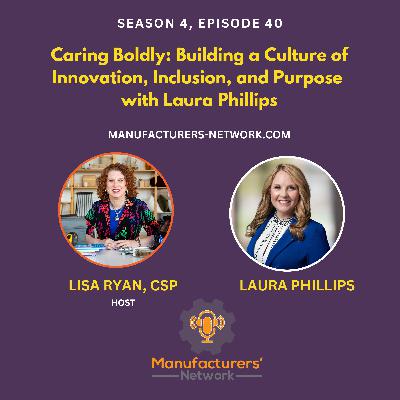
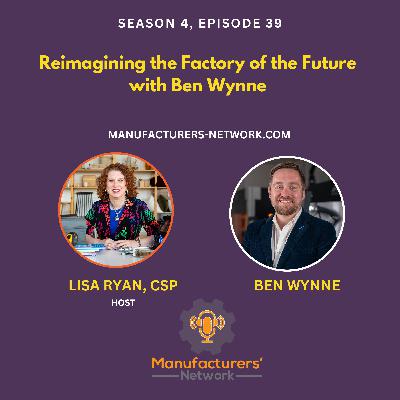
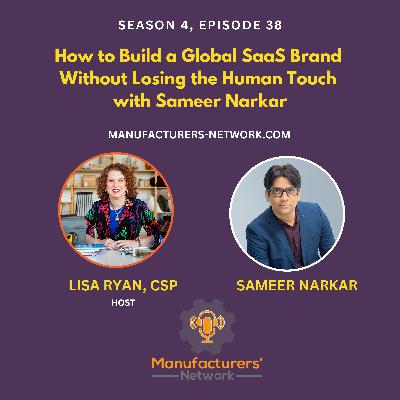
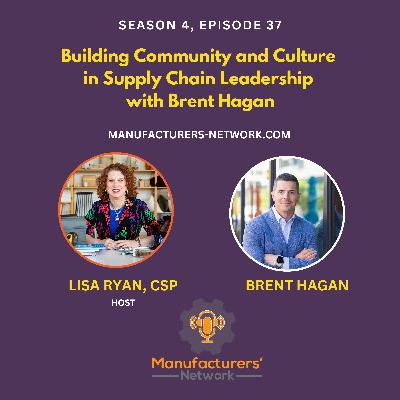

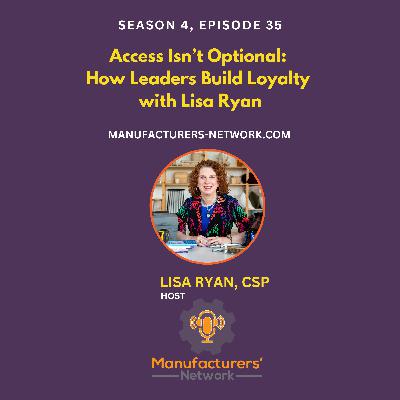
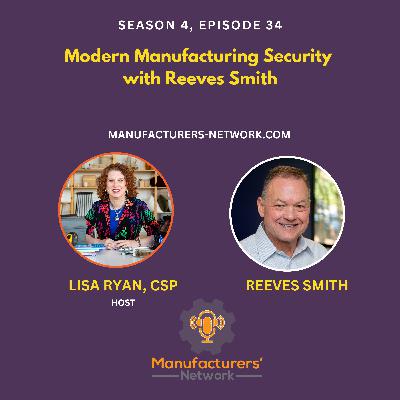
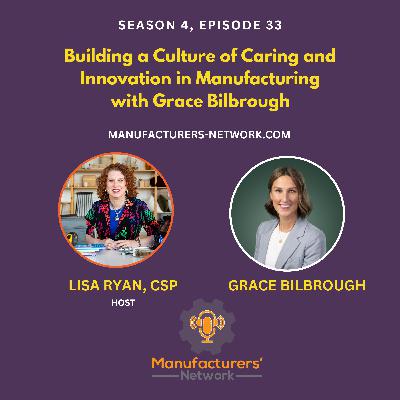
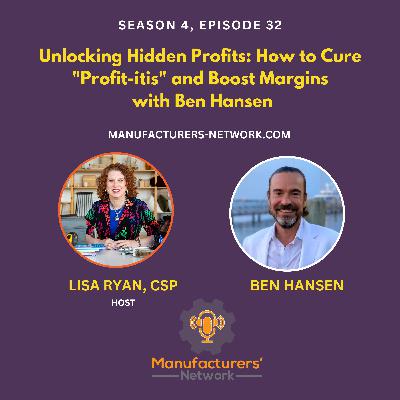
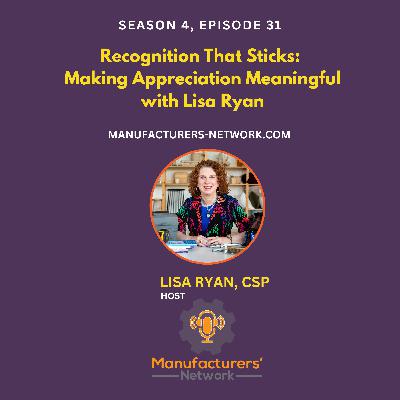

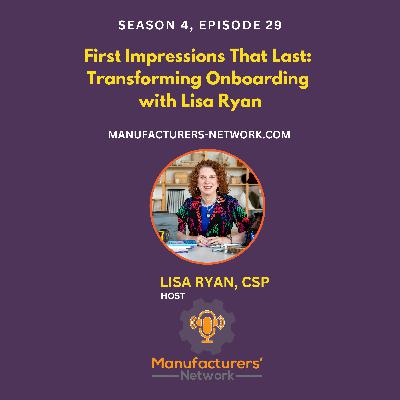

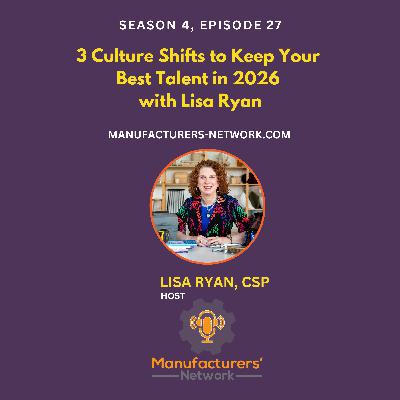
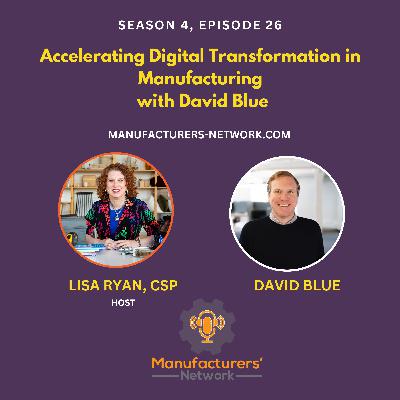



listened intently but didn't hear anything new or groundbreaking, it was pretty vague and generic